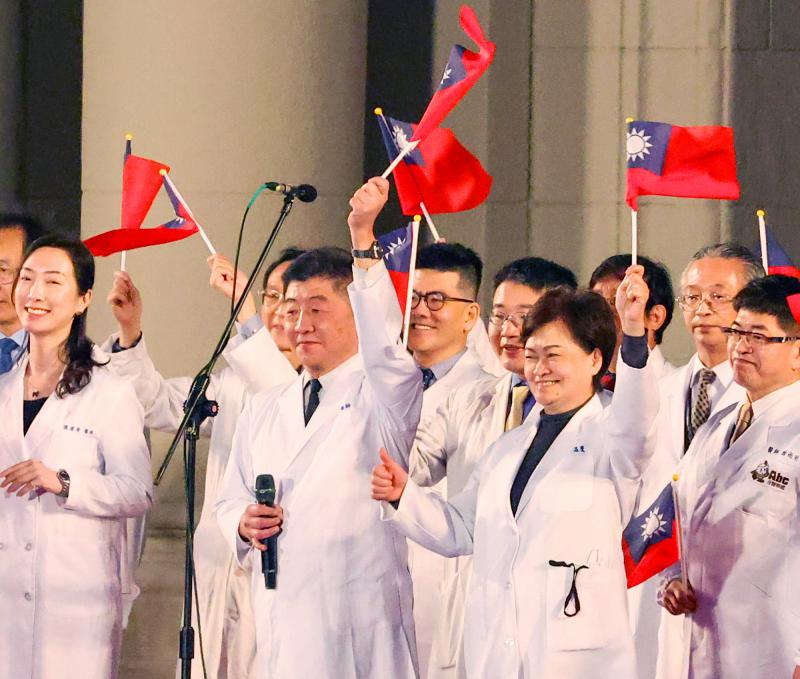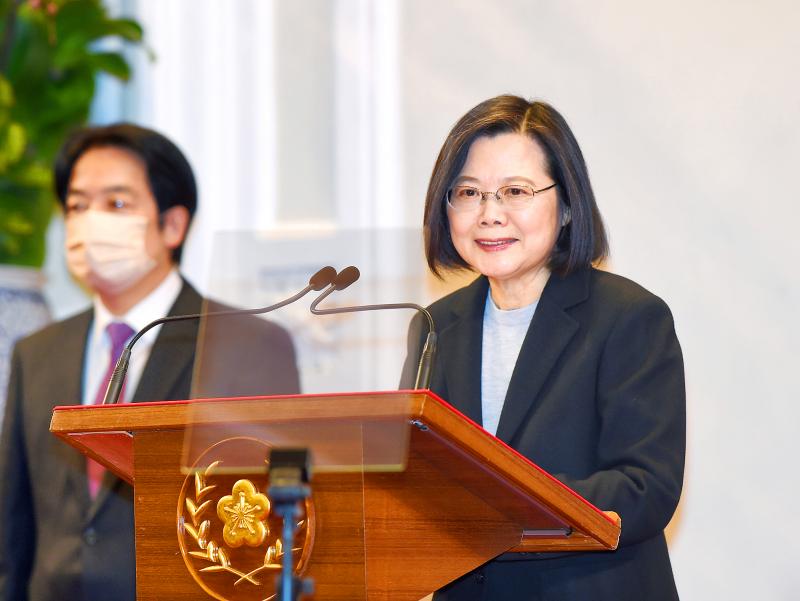President Tsai Ing-wen (蔡英文) yesterday called on China to renounce the use of force against Taiwan to resolve cross-strait differences, saying a military confrontation would severely affect the economies and people of both sides.
Taiwan and China face challenges economically amid the COVID-19 pandemic and both governments are responsible for the welfare of their respective citizens, Tsai said in her New Year address from the Presidential Office in Taipei.
Taipei has called on Beijing to stop its military and diplomatic coercion, as such actions are detrimental to maintaining regional peace and stability, she said.

Photo: CNA
She reaffirmed that Taiwan would not bow to Chinese pressure, while urging Beijing not to misjudge the situation nor allow itself to be taken hostage by “military adventurism.”
“The use of military means is absolutely not an option to resolve the differences between our two sides,” she said.
“Only by upholding peace and stability in the Taiwan Strait, with each side working to take care of people’s livelihoods and put their minds at ease, can there be proper space and atmosphere for our two sides to peacefully and collectively address and seek solutions to the problems we face. Only in this way can we reduce regional tensions,” she added.

Photo: Fang Pin-chao, Taipei Times
“Continuing our global engagement, maintaining our economic momentum, strengthening our social security network and safeguarding our nation’s sovereignty are the four pillars of our plan for stable governance in 2022,” Tsai said.
Taiwan has over the past year faced ups and downs due to domestic COVID-19 cases, she said, adding that Taiwan also went through a heated debate over four referendums, all of which failed to pass.
This shows the high quality of Taiwanese and how the nation can resolve differences via democratic mechanisms and stay united, she said.
The referendum results show Taiwan’s resolve to be open to the world, as well as its hope to deepen trade ties with the US, paving the way for a bilateral free-trade agreement with Washington, Tsai said.
The government would continue to rally support among members of the Comprehensive and Progressive Agreement for Trans-Pacific Partnership to bolster its bid to join the trade bloc, she said.
It would also seek to improve exchanges with the EU with a new project to boost supply chain cooperation, she added.
Tsai said Taiwan would continue to monitor the situation in Hong Kong.
“The pursuit of democracy and freedom is not a crime, and Taiwan’s position in support of Hong Kong will not change. Aside from showing our concern, we will cherish our own hard-earned freedom and democracy even more deeply,” she said.
Tsai delivered her address after attending a flag-raising ceremony in front of the Presidential Office Building.
Minister of Health and Welfare Chen Shih-chung (陳時中), who heads the Central Epidemic Command Center, led the singing of the Republic of China national anthem at the ceremony, along with a group of 60 medical care workers, including doctors, nurses and traditional Chinese medicine practitioners.
The ceremony aimed to honor the country’s medical workers, who have been working to combat the COVID-19 pandemic over the past two years, the organizers said.
Separately, China’s Taiwan Affairs Office spokeswoman Zhu Fenglian (朱鳳蓮) yesterday attributed cross-strait tensions to “the Democratic Progressive Party administration’s refusal to recognize the 1992 consensus,” adding that Tsai’s four pillars “conceal the evil intent of separatism.”
Beijing wishes that “compatriots from across the Strait would join hands in opposing the adventurism of Taiwanese independence and manipulation by external forces, and would [support the] maintenance of cross-Strait peace and the completion of the total unification of the fatherland,” she added.
The so-called “1992 consensus” — a term former Mainland Affairs Council chairman Su Chi (蘇起) in 2006 admitted making up in 2000 — refers to a tacit understanding between the Chinese Nationalist Party (KMT) and the CCP that both sides of the Taiwan Strait acknowledge that there is “one China,” with each side having its own interpretation of what “China” means.
Additional reporting by Wu Su-wei

Taiwan last night blanked world No. 1 Japan 4-0 to win the World Baseball Softball Confederation’s (WBSC) Premier12 for the first time. Taiwanese ace Lin Yu-min (林昱珉) held defending champions Japan to just one hit and no runs in the first four innings, before catcher Lin Chia-cheng (林家正) opened the fifth inning with a solo home run. That was soon followed by a three-run homer from Taiwanese captain Chen Chieh-hsien (陳傑憲) to put Taiwan ahead in the prestigious tournament of the world’s top 12 baseball teams. In addition to a superb performance from 21-year-old Arizona Diamondbacks prospect Lin, three more Taiwanese pitchers

SUPPORT: Arms sales to NATO Plus countries such as Japan, South Korea and Israel only have to be approved by the US Congress if they exceed US$25m The US should amend a law to add Taiwan to the list of “NATO Plus” allies and streamline future arms sales, a US commission said on Tuesday in its annual report to the US Congress. The recommendation was made in the annual report by the US-China Economic and Security Review Commission (USCC), which contained chapters on US-China economic and trade ties, security relations, and Taiwan and Hong Kong. In the chapter on Taiwan, the commission urged the US Congress to “amend the Arms Export Control Act of 1976 to include Taiwan on the list of ‘NATO Plus’ recipients,” referring to

Taiwan yesterday advanced to the gold medal match of the World Baseball Softball Confederation’s (WBSC) Premier12 for the first time in history, despite last night losing 9-6 to Japan. Taiwan advanced after the US defeated Venezuela in the first game on the last day of the Super Round. However, the US had no chance of advancing to the championship game unless it defeated Venezuela by at least nine points. The US won 6-5. As a result, the two teams — who both had one win and two losses in the Super Round — are to face off again in the

Minister of Labor Ho Pei-shan (何佩珊) said she would tender her resignation following criticism of her handling of alleged bullying by Ministry of Labor Workforce Development Agency branch director Hsieh Yi-jung (謝宜容) resulting in the death of an employee. The ministry yesterday gave Hsieh two demerits and said she is subject to review by the Disciplinary Court. The severest possible punishment would be her removal from office and being barred from government jobs indefinitely. Workforce Development Agency Director-General Tsai Meng-liang (蔡孟良) also received a major demerit and was transferred to another position. Premier Cho Jung-tai (卓榮泰) issued a formal apology